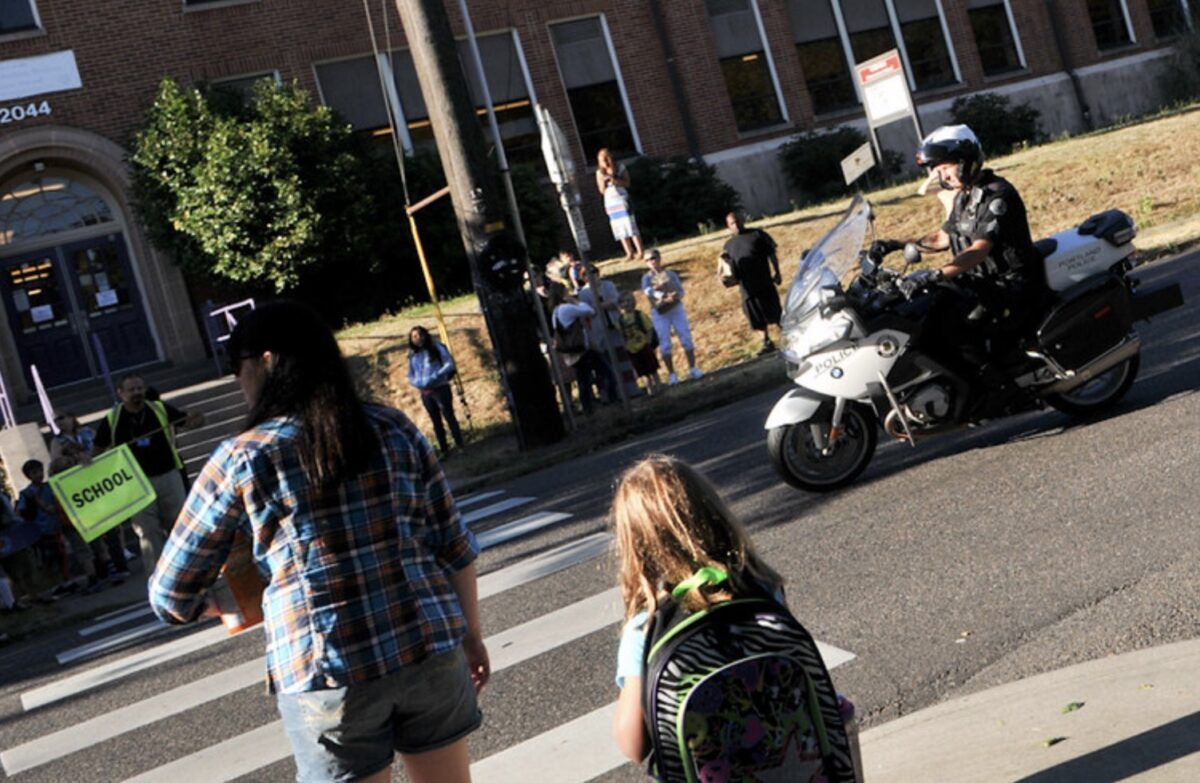
(Photo: Jonathan Maus/BikePortland)
“Being an anti-racist organization… we are committed to continuing to take clear and decisive steps to undo the systems that prevent Black people, indigenous people, and people of color from moving around.”
— Safe Routes Partnership
Cities and organizations have spent nearly two decades developing “safe routes to school” plans to keep kids safe on streets while they walk and bike to class. Guiding their work since around 2005 has been a concept known as “The 5 Es”. This approach says the best way to boost non-car trips is to focus on a mix of education, encouragement, engineering, evaluation, and enforcement.
That last “E” of enforcement has fallen out of favor in recent years because of how policing has a disproportionate impact on people of color.
Today, amid nationwide protests and outrage over racism in our police system, the nonprofit Safe Routes to School Partnership announced “enforcement” will no longer be a part of their organizing framework. The Partnership has an active advocacy presence in our region and is the leading national voice for Safe Routes with connections to major groups like the AARP, National PTA, America Heart Association, and many others.
“Over the past several years, our organization has actively worked to advance social justice and racial equity,” reads a statement published by the organization today. “And we have struggled with the Enforcement E for some time… Through an examination of what is within our organization’s ability to change, and more importantly listening to our staff, organizational partners, and partners in the field, we know that approach is no longer sufficient.”
Advertisement
The Safe Routes Partnership says they’re an “anti-racist organization”, committed to, “clear and decisive steps to undo the systems that prevent Black people, indigenous people, and people of color from moving around…” and that they will no longer recommend the use of law enforcement-based programs.
“We know our history and we seek to correct it.”
— Kari Schlosshauer, Safe Routes Partnership Pacific Northwest
Supplanting “enforcement” will be a new “E” of engagement. Reflecting the importance of letting impacted communities lead, the Partnership says, “It will be the first E as listening to community members and working with existing community organizations is how Safe Routes to School initiatives should begin.”
The City of Portland has grappled with this enforcement issue as well. While not a large part of their Safe Routes to School program, the Portland Bureau of Transportation currently partners with the Portland Police Bureau to enforce speed limits and other traffic laws around schools. For PBOT, the tension around enforcement is within their Vision Zero and traffic safety programs.
When developing their Vision Zero Action Plan in 2015 PBOT and community partners opted to prioritize data and equity — not enforcement — to make streets safer. There was significant disagreement on PBOT’s Vision Zero Task Force about the role of enforcement, but they ultimately voted to not include any stepped-up policing in their official recommendations. Their concerns centered around a lack of trust of the PPB and fears of racial profiling.
“The enforcement actions in this plan are limited in order to reduce the possibility of racial profiling and disparate economic impacts,” the final Vision Zero plan reads.
This new scrutiny on police in Safe Routes programming comes as Portland works to remove PPB school resource officers (SROs) from high school campuses. Regional leaders with Safe Routes Partnership strongly support that move. While school-based police were a big part of the group’s guidance in the past, recent research shows they contribute to the “school-to-prison pipeline”.
Asked about this issue on Twitter last week, Safe Routes Partnership Pacific Northwest Regional Policy Manager Kari Schlosshauer (who we interviewed in 2018) said, “We acknowledge that SRTS [Safe Routes to School] programs have relied on Enforcement with police, and have not listened enough to concerns from Black communities and youth of color. We know our history and we seek to correct it.”
“The bottom line,” she continued, “is that defunding SROs supports what Black youth and families have been asking for for years. We cannot change the past, but we can learn from it.”
Tomorrow Portland City Council will take on the topic of police reform. Leading that discussion will be City Commissioner Jo Ann Hardesty who will push for five budget amendments targeted at reducing the power and influence of the PPB.
— Jonathan Maus: (503) 706-8804, @jonathan_maus on Twitter and jonathan@bikeportland.org
— Get our headlines delivered to your inbox.
— Support this independent community media outlet with a one-time contribution or monthly subscription.

